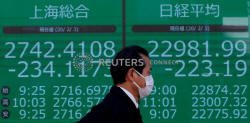Virus-hit stocks shed $3 trillion; safe havens thrive
 Send a link to a friend
Send a link to a friend
 [February 27, 2020] By
Thyagaraju Adinarayan and Saikat Chatterjee [February 27, 2020] By
Thyagaraju Adinarayan and Saikat Chatterjee
LONDON (Reuters) - Risk aversion drove
global stocks lower on Thursday, increasing their drop in value this
week alone to more than $3 trillion, and U.S. Treasuries yields hit
record lows as the coronavirus spread faster outside China than in.
The number of new infections in China - the source of the epidemic - was
for the first time overtaken by new cases elsewhere on Wednesday,
raising fears that the outbreak could become a pandemic.
The pan-European STOXX 600 index fell 2.5% and the blue-chip index in
Italy - the worst-hit country in Europe - sank as dozens of European
companies issued warnings about potential damage to their profits.
In the United States, Microsoft became the second trillion-dollar
company to warn about its results after Apple. Its Frankfurt-listed
shares were down 3%.
Global equities have now fallen for six straight days, and Wall Street's
volatility gauge was near its late-2018 highs.

(Graphic: Daily market value loss -
https://fingfx.thomsonreuters.com/
gfx/buzzifr/15/7815/7815/Pasted%20Image.jpg)
Spot gold rose 0.6% to $1,649 per ounce, just shy of the seven-year high
it hit on Monday, and silver gained 1% to $18.03 an ounce.
"Safe-haven currencies are doing very well and gold is heading back
higher, and unless we see a slowdown in the coronavirus cases outside
China, risk sentiment will continue to be undermined," said Peter
Kinsella, global head of FX strategy at UBP in London
Yields on U.S. Treasuries, which fall when prices rise, dropped below
1.3% for 10-year debt and the yield curve continued to send recession
warnings.
NO DEEP BEAR MARKET?
Markets are pricing a roughly even chance the Federal Reserve will cut
interest rates next month and have almost fully priced in a cut by
April. <0#FF:>
Yields on benchmark German 10-year debt fell to -0.5140%. Italian debt
underperformed as the spread of the virus there raised fears of a
recession.
Goldman Sachs said the equity market sell-off would create opportunities
to add risk eventually and that it did not expect a deep bear market or
U.S. recession.
[to top of second column] |

A man wearing a surgical mask walks past a screen showing Shanghai
Composite index and Nikkei index outside a brokerage in Tokyo, Japan
February 3, 2020. REUTERS/Kim Kyung-Hoon

"However, near term we feel that positioning and valuations are not yet
depressed enough and uncertainty on the global growth impact from the
coronavirus is likely to remain high," Goldman Sachs said in a note to
clients.
E-mini futures for the S&P 500 were down 0.9% and oil - sensitive to
global growth - fell more than 2% to its cheapest in 14 months. [O/R]
(Graphic: U.S. stock futures-
https://fingfx.thomsonreuters.com/
gfx/mkt/13/2595/2560/US%20stock%20futures.png)
Analysts have downgraded forecasts for Chinese and global growth, and
policymakers from Asia, Europe and the United States have begun to
prepare for a steeper economic downturn.
South Korean stocks shed another 1.05% on Thursday, closing at a
four-month low, as it reported its largest daily rise in new virus cases
since its first infection last month.
Unnerving investors further, the Bank of Korea kept interest rates
unchanged on Thursday even though it downgraded its growth outlook.
With the infection rate in China slowing, the blue-chip CSI300 index
finished up 0.3%. China's central bank said on Thursday it would ensure
ample liquidity to help limit the impact of the epidemic.
MSCI's broadest index of Asia-Pacific shares outside Japan fell 0.5%,
taking it more than 4% lower for the week.
Taiwan raised its epidemic response level to the highest possible and
Japan's Nikkei dropped 2% to a four-month low amid more worries the
Tokyo Olympic Games would be cancelled or shifted. [.T]

The safe-haven yen and the Swiss franc gained on Thursday with the
Japanese currency heading towards 110 yen to the dollar, up nearly 2% so
far this week. The dollar fell 0.32%.
That was enough to help drag the China-sensitive Aussie dollar up from
an 11-year low and lend support to the euro. [FRX/]
(Additional reporting by Tom Westbrook in Singapore and Tom Arnold in
London; editing by Larry King and John Stonestreet)
[© 2020 Thomson Reuters. All rights
reserved.] Copyright 2020 Reuters. All rights reserved. This material may not be published,
broadcast, rewritten or redistributed.
Thompson Reuters is solely responsible for this content. |